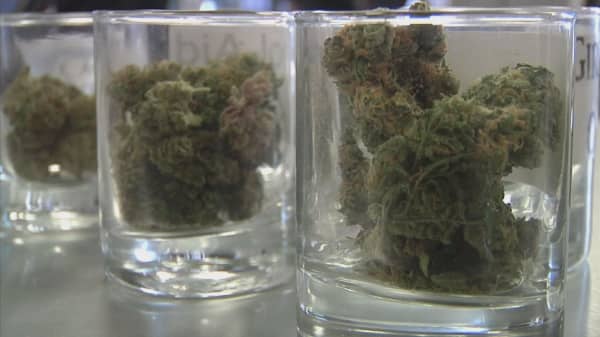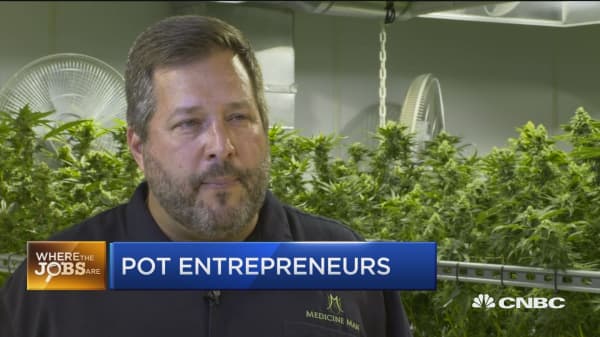U.S. federal law that classifies marijuana as a Schedule 1 Drug (the same category as heroin and LSD), and places restrictions on interstate commerce as well as banking, puts America at a competitive disadvantage when it comes to expanding both our domestic and international markets. Canada is now attracting large-pocket investors who are cautious about putting their funds into the American market while a number of Canadian companies are investing in the U.S. and licensing some of our most popular brands and products. Canada has also reached an agreement with Germany to allow the European superpower to import medical cannabis.
Canada's new decriminalization law will allow individual provinces to decide if they want to participate and, if so, to implement and regulate the legalization of marijuana as they see fit. Most provinces don't want to use the dispensary model that has proliferated in the states that have legalized recreational marijuana in the United States. Plus, the marijuana business is going to be highly regulated in Canada, with a ban on advertising and even tougher rules than their alcohol and cigarette laws, and they are also committed to developing new testing technology for driver impairment and work safety compliance.
Canada is taking a very practical approach to this burgeoning industry and at the end of the day they're going to be the world leader. The rest of us are going to have to live and learn from what impact they will have on the marijuana industry because they're going to be the Colorado of federal legalization.
Israel is another country where medical marijuana is federally legal. Many people don't realize that Israel is the world's number two tech market behind only Silicon Valley. Israel has the most start-ups and venture capital funding per capita and has been studying marijuana since the 1960's. In 1964, an Israeli scientist discovered tetrahydrocannabinol, or THC, the main psychoactive constituent of cannabis and he later identified the endocannabinoid system, the foundation of medical cannabis methodology.
With some of the most advanced marijuana researchers producing many of the best testing results, doctors from around the world go to Israel to collaborate and participate with Israeli scientists and researchers in studies including brain injuries, cancer-fighting drugs and painkillers. The number of licenses granted by The Health Ministry to growers, doctors and patients is being increased to expand the local market, as well as to support industry requests for exports. When it comes to integrating marijuana agriculture, chemistry, drug delivery and pharmacology, no country does it better than Israel.
Let's move on to our mother country, England, where there is no legalized medical or recreational marijuana. To be licensed for sale, drugs need to go through the licensing process, which includes clinical trials. GW Pharmaceuticals is part of Big Pharma in England and is the leading developer of the Sativex, the first cannabis-based medicine to be fully approved and brought to market in any country (it's now available in 28 countries). Sativex is an oral spray marketed as an adjunctive treatment for multiple sclerosis and is also undergoing clinical trials as an analgesic for cancer-related pain.
GW has already applied for approval of Sativex in the U.S. and is going through trials. The Catch 22 is that, to bring their drug here, GW needs FDA approval and the FDA is not going to approve anything as a drug or medicine that's classified as Schedule 1.
In my opinion, one of the main reasons marijuana wasn't reclassified by the Drug Enforcement Administration and Food and Drug Administration during the Obama administration was to protect American pharmaceutical companies against GW. Until there's a true American competitor, like a Pfizer, Johnson & Johnson or Roche, it's a business decision at the government level not to lose the advantage to a foreign company. So, Big Pharma is going to continue to lobby against marijuana legalization until they have a competing product.
Other countries that have decriminalized or legalized medical marijuana include Spain, Mexico, Australia, Italy, Colombia and South Africa. All of these nations and many more passing new marijuana laws and regulations prove that the legalization of marijuana is a topic of interest around the world and that the science and business of cannabis will continue to expand. There are also real opportunities overseas to advance the synergy between marijuana science, education and private business. The venture capital company Kingsley Capital Partners has invested $12 million dollars at Oxford University to study medical cannabis for treating pain, cancer and inflammatory diseases.
So where does that leave America in the global market, especially when the current administration has indicated no firm policy on marijuana yet? Recent conversation in Washington about renewing the war on drugs and appointments of anti-marijuana hardliners has left some cannabis industry leaders nervous about the future. But I believe President Trump will leave marijuana as a states' rights issue. He campaigned as being a "jobs" president and legal marijuana creates jobs and adds new tax revenue that could benefit all Americans. It may sound outlandish, but in my mind, any talk about a massive infrastructure program in this country should include marijuana state tax revenues as part of the conversation. It has been proven in both Colorado and Washington that marijuana is a tax generator and a job creator.
The bottom line is that marijuana in America is all about politics. Until we have credible institutions based here that can talk about scientific results from tests and clinical trials, marijuana as a business, as well as a medicine, will not reach its full potential. A recent Gallup Poll showed that 60 percent of Americans support marijuana legalization and if we want to achieve our goals, it's our job to make sure that the conversation in Washington continues. We are a land of choice and people should be able to get medicine that works for them. People should be able to make decisions about what suits their lifestyle. If you add the right to enjoy optimum health to the preservation of life, liberty and the pursuit of happiness, you have the same fundamental principles of the marijuana movement. And one more thing — capitalism is part of our DNA.
So let the 420 party roll as we honor the long struggle that has led to so much positive change and progress. But when that buzz begins to wear off, we need to remember that we got here because we've been busy advocating, not just celebrating. If the United States seeks to become a global leader in marijuana science, medicine and trade, we need to look around the world and learn because we are not number one.
But there is some good news. This country has always been proud of products that can claim "Made in America." And nothing is more American than marijuana.
Commentary by David Dinenberg, the founder and CEO of Kind Financial, which provides financial technical support for the cannabis industry. Follow him on Twitter @daviddinenberg.
Follow CNBC's Opinion section on Twitter @CNBCopinion.
Watch: The marijuana gold rush





